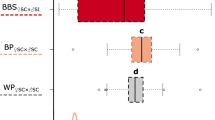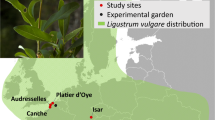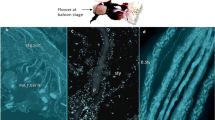Abstract
SELF-COMPATIBILITY is rare in marrow-stem kale (Brassica oleracea var. acephala) and usually occurs only in plants which have S alleles low in the dominance series. In such plants, genes, independent of the S alleles, determine self-compatibility1. In other botanical varieties of B. oleracea self-compatibility is common and this suggests that these varieties might have the S alleles of low dominance found in marrow-stem kale.
This is a preview of subscription content, access via your institution
Access options
Subscribe to this journal
Receive 51 print issues and online access
$199.00 per year
only $3.90 per issue
Buy this article
- Purchase on Springer Link
- Instant access to full article PDF
Prices may be subject to local taxes which are calculated during checkout
Similar content being viewed by others
References
Thompson, K. F., Plant Breeding Institue, Cambridge, Ann. Rep., 41 (1959–1960).
Sampson, D. R., Genetics, 42, 253 (1957).
Lewis, D., Heredity, 5, 399 (1951).
Dodds, K. S., John Innes Institute, Ann. Rep., 52, 22 (1961).
Author information
Authors and Affiliations
Rights and permissions
About this article
Cite this article
THOMPSON, K., TAYLOR, J. Identical S Alleles in Different Botanical Varieties of Brassica oleracea. Nature 208, 306–307 (1965). https://doi.org/10.1038/208306b0
Issue Date:
DOI: https://doi.org/10.1038/208306b0
This article is cited by
-
Progress on deciphering the molecular aspects of cell-to-cell communication in Brassica self-incompatibility response
3 Biotech (2018)
-
Gametophytic self-incompatibility re-examined: a reply
Heredity (1985)
-
Self-incompatibility antigens and S gene expression in Brassica
Heredity (1979)
-
Productivity of F hybrids of botanical varieties ofBrassica oleracea L.
Euphytica (1970)
-
Levels of compatibility in Brassica Oleracea
Heredity (1968)
Comments
By submitting a comment you agree to abide by our Terms and Community Guidelines. If you find something abusive or that does not comply with our terms or guidelines please flag it as inappropriate.



